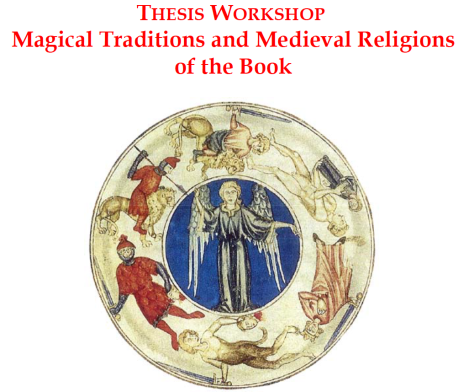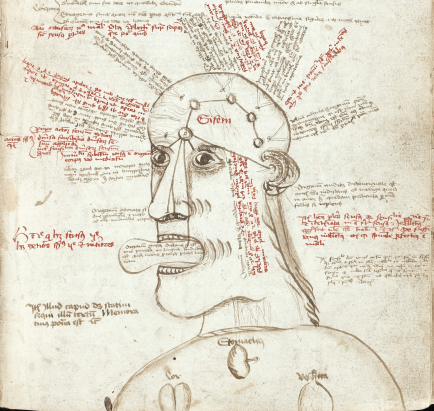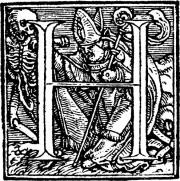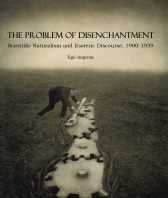For some time now, a debate has been rolling about the status of “pagan studies” as a field of academic research. It’s not that there’s been any doubt about the importance of studying contemporary paganisms; on the contrary, academic as well as mainstream interest in reconstructionist pagan groups as well as magical groups along the lines of Wicca and Thelema, still appears (anecdotally) on the increase. The problem has rather been with the aims and goals of pagan studies as a prospective discipline, as well as the approaches advocated for studying it. In an article just published in The Pomegranate – the foremost (or, rather, the only) peer-reviewed academic journal dedicated to this field – the up-and-coming (and highly productive) scholar, Ethan Doyle White (known from the Albion Calling blog), argues that the time has come for reform.
ESSWE Thesis Workshop at the Warburg Institute (July 7, 2016)
 This summer, ESSWE organizes its fourth biannual Thesis Workshop – a one-day event where MA and PhD candidates get together with established scholars to discuss papers on a given topic as well as research strategies and career advice. (For a basic idea, check out what I’ve said about the 2010, 2012, and 2014 workshops) This year’s topic is “Magical Traditions and Medieval Religions of the Book”. Unlike earlier years, when this event took place in Amsterdam, this year’s workshop will be hosted by the Warburg Institute in London, on July 7.
This summer, ESSWE organizes its fourth biannual Thesis Workshop – a one-day event where MA and PhD candidates get together with established scholars to discuss papers on a given topic as well as research strategies and career advice. (For a basic idea, check out what I’ve said about the 2010, 2012, and 2014 workshops) This year’s topic is “Magical Traditions and Medieval Religions of the Book”. Unlike earlier years, when this event took place in Amsterdam, this year’s workshop will be hosted by the Warburg Institute in London, on July 7.
As in previous years, the day has two main sessions: an “oratory” (lectures by specialists), and a “laboratory” (group-based discussions of MA/PhD research related issues, divided by period and/or thematic focus based on what people are working on). In addition, this year there will be a round table discussion following the oratory, and an “early career advice” session (which will be lead by Liana Saif and myself).
The oratory will feature papers by Siam Bhayro, Liana Saif, and Adelina Angusheva-Tihanov, with a keynote by Jean-Patrice Boudet. These scholars will be available to participants in the laboratory session, as will the chairs Yuri Stoyanov, Charles Burnett, organizer Sophie Page, and most of the board members of ESSWE.
Check out all the details in the programme. And, please note that this is a free event with a limited number of places. Questions and reservations should be addressed to the organizer Sophie Page (see the programme).
The scholastic imagination

The human sensory and cognitive system, according to the German scholar Johan Lindner of Mönchenburg. Illustration to a manuscript copy of Aristotle’s De Anima (1472-1474), courtesy of the Wellcome Collection (MS 55).
I’ve recently been reading up on medieval theories of cognition. The background is a paper I’m writing on esotericism and “kataphatic practices” – contemplative techniques where the practitioner uses mental imagery, sensory stimuli, and emotions to try and achieve some religious goal: Prayer, piety, divine knowledge, salvation, etc. Kataphatic practices may be distinguished from “apophatic” ones, which, although they may be pursuing the same goals, use very different techniques to achieve them: withdrawing from sensory input and attempting to empty the mind of any content, whether affective, linguistic, or imagery-related (note that the kataphatic-apophatic distinction is more commonly used as synonymous with positive vs. negative theology – that’s a related but separate issue to the one I talk about here). My argument is that esoteric practices are typically oriented toward kataphatic rather than apophatic techniques. The cultivation of mental imagery is usually key – which means that the notion of “imagination” needs to be investigated more thoroughly.
Review symposium on “The Problem of Disenchantment”
The Journal of Religion in Europe has just published a review symposium on my book, The Problem of Disenchantment (2014). I’m excited to say that it contains critical reflections from three world-class scholars of religion, along with my own response. Hans Kippenberg, a well-known expert on Weberian approaches to the history of religion, evaluates some of the book’s claims in light of a broader reading of Weber’s oeuvre. Willem Drees, one of the leading figures in the “religion and science” field, takes a closer look at some of the points I made about the new natural theologies that emerged in the early twentieth century – specifically their relation to esotericism and “heterodoxy”. Finally, Ann Taves, a leading American scholar of religion working with (among other things) the cognitive science of religion and the notion of experience, continues a discussion that she and I have been having over the past few years regarding the perception, explanation and interpretation of “events” (for more on this, check out our forthcomming co-authored target article in Religion, Brain, & Behavior) . If you’ve got access, go ahead and read them!
While you are at it, you may also be interested in checking out my response, which I called “The Disenchantment of Problems: Musings on a Cognitive Turn in Intellectual History” (non-final version uploaded here, and added to my Academia page for easy access).
Esotericism in Antiquity: An Aries special issue
 There is much exciting work going on in the area of esotericism and the religions of antiquity at the moment. One of the people who have been instrumental in lifting the focus on antiquity within the study of esotericism (and bringing esotericism to a sometimes unwilling crowd of Gnosticism and ancient Christianities specialists – kudos for that!) is Dylan Burns, currently of the University of Leipzig. I’ve written about Dylan’s work previously, and of course, there’s been mention of the ESSWE Network for the Study of Esotericism in Antiquity (NSEA) which he co-founded with Sarah Veale.
There is much exciting work going on in the area of esotericism and the religions of antiquity at the moment. One of the people who have been instrumental in lifting the focus on antiquity within the study of esotericism (and bringing esotericism to a sometimes unwilling crowd of Gnosticism and ancient Christianities specialists – kudos for that!) is Dylan Burns, currently of the University of Leipzig. I’ve written about Dylan’s work previously, and of course, there’s been mention of the ESSWE Network for the Study of Esotericism in Antiquity (NSEA) which he co-founded with Sarah Veale.
Now, fresh off those unobtanium-coated Brill printers (more…)
Books from the Esoteric Brat Pack
As a member of what’s been called the “brat pack” of esotericism scholars I am proud to note that a considerable number of us are appearing on the scene this year with monographs based on PhD dissertations. The brat pack presumably consists of a group of (then) students and emerging scholars who were around at the time of ESSWE 1 in 2007, and who have frequently been seen together at conferences since. While some of us have teamed up for joint gigs in the past (think The Devil’s Party or Contemporary Esotericism, and the conferences that went with both of these), it looks like 2014 is the big year for solo work. I know of at least four titles either published or forthcoming in 2014 by (for the most part) recent PhDs working in the field of Western esotericism. There may be other publication plans I am not aware of (please leave a note!). Here’s a chronological list of the knowns.
Theosophical Appropriations – videos from a workshop
The INASWE [Israeli Network for the Academic Study of Western Esotericism] has done it again. Videos from a workshop held last December on the theme of “Theosophical Appropriations: Kabbalah, Western Esotericism, and the Transformation of Traditions” are now online, and they show an impressive number of great scholars talking about intriguing aspects of modern esotericism, angled through the Theosophical current one way or another. The conveners Julie Chajes and Boaz Huss have done a great job putting together this group. One of the nice aspects of this collection is the global scope, giving a panoramic view of Theosophical groups across a number of different countries.
As in previous years, it is wonderful that all of this is made available online. So go and watch Karl Baier talk about how the chakras were introduced into Theosophy, John Patrick Deveney lecture on Theosophy as Lesenmysterium, Moshe Idel pontificate on Theosophy and Kabbalah in Romania, Massimo Introvigne entertain on the topic of Canadian Theosophy, and let Marco Pasi enlighten you on the role of the Theosophical movement in Italian esoteric milieus. And much, much more.
Religion and Transhumanism conference – May 10
May will be a busy travel and conference month for some of us. One event that I regret having to miss is the newest initiative of the Brighter Brains Institute (the guy[s] who do the Transhuman Visions series): “Religion and Transhumanism”. I’ve been writing and speaking about this topic on and off for about a year, and was sorry to have to turn down an offer to speak at this event. It should be interesting:
“14 speakers from different Faiths – Islam, Raelism, Lutheran, Mormon, Catholic, Seventh Day Adventist, Buddhist, Wicca, Urantia, Terasem, Atheism, Agnosticism – will discuss the similarities and contradictions of Religion and Transhumanism. 3 panels + plenty of time to get your questions answered.”
For others in or around the Bay Area who might be interested, the event takes place on May 10, from 9am – 9pm at Piedmont Veteran’s Hall, 401 Highland Avenue, Piedmont, California.
Religion in the Age of Cyborgs. An essay and a lecture
 What happens to religion if the future belongs to the cyborgs? I’ve just written a weird essay addressing this topic, and am currently finishing up a lecture on the same topic for the Transhuman Visions conference in Piedmont on Saturday. The published piece is a response essay that I was asked to write for The Religious Studies Project, answering to an interview with the influential cognitive neuroscientist / evolutionary psychologist Merlin Donald. It’s a strange concoction of evolutionary theory, cultural history, futurist forecasting, transhumanism, distributed cognition, extended mind hypothesis, and cognitive science of religion. Pretty speculative all over, in fact, but fun to write. Check it out if you’re into that sort of thing. The talk to the transhumanists is going to be even more speculative, so you’re warned!
What happens to religion if the future belongs to the cyborgs? I’ve just written a weird essay addressing this topic, and am currently finishing up a lecture on the same topic for the Transhuman Visions conference in Piedmont on Saturday. The published piece is a response essay that I was asked to write for The Religious Studies Project, answering to an interview with the influential cognitive neuroscientist / evolutionary psychologist Merlin Donald. It’s a strange concoction of evolutionary theory, cultural history, futurist forecasting, transhumanism, distributed cognition, extended mind hypothesis, and cognitive science of religion. Pretty speculative all over, in fact, but fun to write. Check it out if you’re into that sort of thing. The talk to the transhumanists is going to be even more speculative, so you’re warned!








